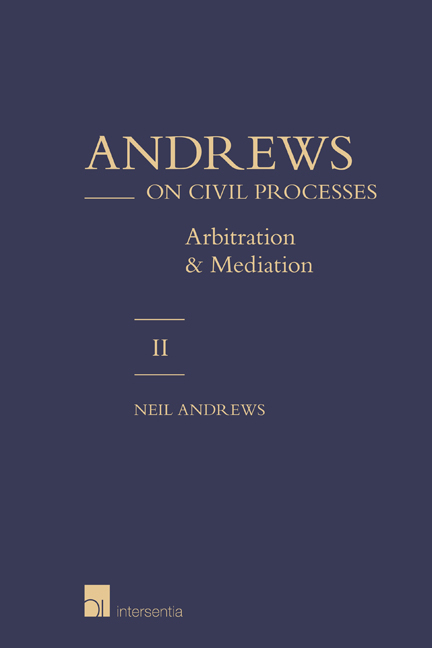Book contents
- Frontmatter
- Dedication
- CONTENTS VOLUME I
- Contents
- Table of Cases
- Table of Statutes
- Table of Statutory Instruments
- PART I MEDIATION
- PART II ARBITRATION
- Chapter 3 Commercial Arbitration: What Is It and Why Choose It?
- Chapter 4 The Major Principles of Arbitration and Litigation: A Comparison
- Chapter 5 Fundamental Features of English Arbitration
- Chapter 6 ‘The Seat’ and the Range of Relevant Laws
- Chapter 7 ‘Arbitrability’: Public Policy Limitations upon the Scope of Arbitration
- Chapter 8 A Confidential Process
- Chapter 9 Arbitration Agreements
- Chapter 10 Courts Giving Effect to Arbitration Agreements
- Chapter 11 Commencement of the Submission and Time Issues
- Chapter 12 The Tribunal's Appointment, Tenure and Immunity
- Chapter 13 Pre-Hearing Proceedings
- Chapter 14 The Hearing
- Chapter 15 Final Remedies, the Award, and Correction of the Award by the Tribunal
- Chapter 16 Fees, Expenses and Recoverable Costs
- Chapter 17 Arbitration Awards: Issues of Finality and Res Judicata
- Chapter 18 Challenges to English Arbitral Awards under English Law
- Chapter 19 English Enforcement of English Awards
- Chapter 20 Enforcement under the New York Convention (1958)
- PART III CONSUMER ADR
- Select Bibliography
- Index to Volumes I and II
Chapter 10 - Courts Giving Effect to Arbitration Agreements
from PART II - ARBITRATION
Published online by Cambridge University Press: 13 December 2017
- Frontmatter
- Dedication
- CONTENTS VOLUME I
- Contents
- Table of Cases
- Table of Statutes
- Table of Statutory Instruments
- PART I MEDIATION
- PART II ARBITRATION
- Chapter 3 Commercial Arbitration: What Is It and Why Choose It?
- Chapter 4 The Major Principles of Arbitration and Litigation: A Comparison
- Chapter 5 Fundamental Features of English Arbitration
- Chapter 6 ‘The Seat’ and the Range of Relevant Laws
- Chapter 7 ‘Arbitrability’: Public Policy Limitations upon the Scope of Arbitration
- Chapter 8 A Confidential Process
- Chapter 9 Arbitration Agreements
- Chapter 10 Courts Giving Effect to Arbitration Agreements
- Chapter 11 Commencement of the Submission and Time Issues
- Chapter 12 The Tribunal's Appointment, Tenure and Immunity
- Chapter 13 Pre-Hearing Proceedings
- Chapter 14 The Hearing
- Chapter 15 Final Remedies, the Award, and Correction of the Award by the Tribunal
- Chapter 16 Fees, Expenses and Recoverable Costs
- Chapter 17 Arbitration Awards: Issues of Finality and Res Judicata
- Chapter 18 Challenges to English Arbitral Awards under English Law
- Chapter 19 English Enforcement of English Awards
- Chapter 20 Enforcement under the New York Convention (1958)
- PART III CONSUMER ADR
- Select Bibliography
- Index to Volumes I and II
Summary
INTRODUCTION
This is a tough topic, because the law has become convoluted and there is also the prospect of changes to European law to remove the inconvenient West Tankers case (10.49 ff).
The following propositions will be developed in this chapter:
(i) A stay of judicial proceedings is the primary mechanism for ‘giving effect’ to an arbitration agreement (10.03 ff). Mustill & Boyd (2001) explain a stay's operation in this context:
‘A stay of legal proceedings is the principal means by which an arbitration agreement is enforced, there being no direct power to compel a party, by mandatory injunction, to appoint an arbitrator or to bring his claim by arbitration. A negative injunction is not, since the Judicature Acts [1873–75], the proper remedy for stopping court proceedings in England and Wales, although an injunction may, in a proper case, be granted to stay foreign proceedings brought in breach of an agreement to arbitrate.’ Mustill & Boyd continue: ‘By staying the [English court] proceedings, the court compels the claimant either to proceed by arbitration or to abandon his claim.’
(ii) The New York Convention (1958) requires contracting states to give effect to arbitration agreements (10.22).
(iii) But English courts are more robust: they will issue an injunction to stop a party pursuing litigation or arbitration outside England if that conduct is a violation of an arbitration agreement in respect of which the English court has jurisdiction to ‘police’ compliance (10.23 ff).
(iv) However, the English courts have been at logger-heads with the European Court of Justice. In the (in)famous West Tankers case (10.49 ff), the ECJ held that an anti-suit injunction cannot be granted to stop the (English) respondent from commencing or continuing to pursue court litigation in another Member State within the EU.
(v) Outside the geographical zone of this restriction, however, the English courts retain the power to issue anti-injunctive relief, for example if the off ending proceedings are brought in New York or Singapore, these being jurisdictions outside the European judicial area (10.39 ff).
(vi) Member States’ courts must adhere to a decision of an EU Member State court which involves an incidental decision that an arbitration agreement is not valid or operative (10.56 ff).
- Type
- Chapter
- Information
- Andrews on Civil ProcessesArbitration and Mediation, pp. 211 - 242Publisher: IntersentiaPrint publication year: 2013



